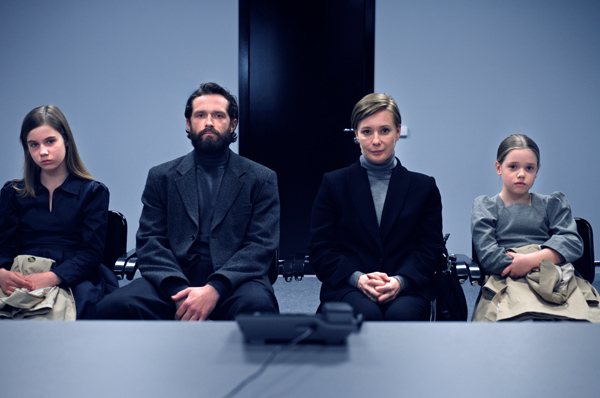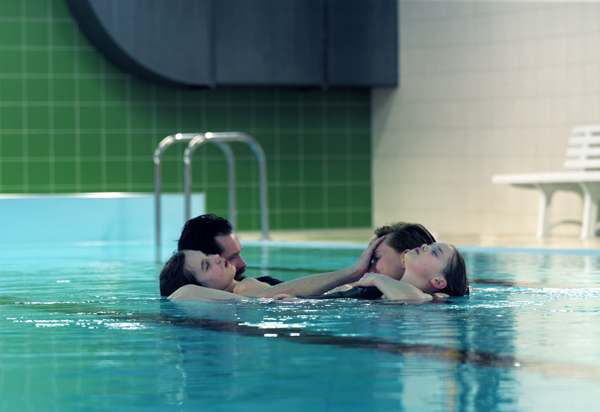Do You Know Where You’re Going To?: Avranas Analyzes Syndrome of a New Century
For his fifth narrative feature, Quiet Life, Greek Weird Wave alum Alexandros Avranas once again steps out of his native country to explore a culturally specific trauma phenomenon. The thrust of the narrative presents a scenario so maddening it seems to take place in a dystopic parallel universe as it examines the plight of Russian parents seeking political asylum in Sweden with their two young daughters in tow. The arduous experience triggers a medical condition recognized in Sweden (at least as a novel diagnostic entry as of 2014) called Child Resignation Syndrome, where emotional trauma specific to asylum seekers from former Soviet and Yugoslav countries causes an indefinite comatose state. Avranas is clearly tackling more than just the occurrence of a specific place and situation, presenting this scenario as he does with an austerity arguably exaggerated but no less implausible considering Sweden’s longstanding documentation of the culture-bound syndrome, suspiciously not recognized by the World Health Organization as a psychiatric condition with a clear diagnosis or treatment. Based on the fictional situation transcribed by Avranas, it would seem there’s a more inherently troubling set of circumstances contributing to the reaction of asylum seekers’ children.
The opening sequence finds two formidably aloof representatives of the Swedish Migration Board paying a visit to Russian refugees Natalia (Chulpan Khamatova) and Sergei’s (Grigoiy Dobrygin) temporary housing, the interior as emotionally sterile as their visitors. Whatever these people are meant to inspect, it’s not in the service of seeming humane. Observing daughters Alina and Katja, they remark, “they look so happy and stable now,” as if the absence of upset itself suggests absolute normalcy. Instead of citizenship, the family seems as if they’ve been as emotionally anesthetized as the human husks of Invasion of the Body Snatchers. With almost gleeful alacrity, the family is denied asylum due to corroborating evidence regarding Sergei’s claims. The only witness to the violence inflicted upon him was his youngest daughter, Katja, who was not asked to testify so as not to further traumatize her. But in the appeal process, requiring new evidence, they’re forced to have Katja step forward. Before she can do so, Katja falls into a coma, where it’s determined she’s suffering from Resignation Syndrome, held within a room alongside a myriad of children also suffering from the same illness. Her parents are forced to undergo demeaning parenting classes so they can learn how to properly behave around their children and, thus, maintain access to Katja. Adriana (Eleni Roussinou), a friendly-ish nurse, secretly tells Natalia this technically isn’t legal, but their family has no way of pushing back.

As their appeal looms, they decide to claim Alina was the witness to the incident, her successful testimony now the perch on which all hope is placed. Training Alina on the narrative proves to be quite strenuous, and when push comes to shove, the appeals board already seems to be aware of this reality, prodded by Lena Endre (The Girl with the Dragon Tattoo, 2009) into admitting perjury. With both of their daughters jeopardized, it would seem Natalia and Sergei have no way out.
Beneath the hypothesis of Child Resignation Syndrome and the strikingly sinister portrayal of the Swedish Migration Board, who place the family in an Orwellian catch-22 nightmare, the real question Quiet Life seems to be asking is how traumatized refugees are unavoidably kept in a state of bureaucratic anguish by whatever safe zone they’re trying to traverse. Sweden’s reputation of being notoriously liberal suggests the welcome mat even in the most supposedly progressive countries is a thinly packaged lie, and watching the ordeal in question suggests it’s almost better to stick with the devil you know—-because an altogether different kind of ruination might await.

Much of this situation also seems metaphorical. Eleni Roussinou, who was quite memorable in Avranas’ 2013 breakout Miss Violence, is the friendly nurse from Montenegro, whose own child suffered the same syndrome, eventually coming out of his coma as irreparably brain damaged. “The longer they sleep, the less normal they wake up,” she warns Natalia. Confirming her son woke up only after her husband died in an accident and she was able to successfully obtain asylum as a widow, the film ominously suggests Natalia may have to make such an executive decision herself.
A much better international offering from Avranos than his last foray outside of Greece, which was his 2016 English language debut, the Jim Carey-led thriller Dark Crimes, there’s still something missing in the third act, which simply brings us to one of several possible moments one could predict would happen before giving us statistics about this disorder. The performances from Khamatova and Dobrygin are effectively empathetic, fleshing out the trauma penned by Stavros Pamballis (who scripted Oliver Hermanus’ 2009 debut, Shirley Adams). Still, the implications of a syndrome tied specifically to one country’s approach to foreigners from specific places suggests those from the host terrain might be suffering from their own ignorant ailment themselves, and Avranos’s chilly, dystopian portrait of Sweden often feels rather daring. Ultimately, however, its bleakness is not met with an equal measure of sagacity.
Reviewed on August 29th at the 2024 Venice Film Festival (81st edition) – Orizzonti section. 99 Minutes.
★★★/☆☆☆☆☆


